 如果你在便利店的碳酸饮料柜台玩过混合大王,你就知道它有多值。总部位于印第安纳波利斯的uFlavor想把这个理念引入自己的饮料中。这个公司在自己的网站上提供42种不同口味的饮料,顾客可以自行混搭,量身打造甜度、碳酸饱和度和咖啡因浓度适合自己的饮料。uFlavor的目标是让自己的产品可以在饮料自动贩卖机上出售。这个主意不错,但实行起来可能比较困难。
如果你在便利店的碳酸饮料柜台玩过混合大王,你就知道它有多值。总部位于印第安纳波利斯的uFlavor想把这个理念引入自己的饮料中。这个公司在自己的网站上提供42种不同口味的饮料,顾客可以自行混搭,量身打造甜度、碳酸饱和度和咖啡因浓度适合自己的饮料。uFlavor的目标是让自己的产品可以在饮料自动贩卖机上出售。这个主意不错,但实行起来可能比较困难。
742亿美元的碳酸饮料行业几乎完全被可口可乐和百事之间的斗争所统治。可口可乐占据42%的市场份额,百事占29%。“目前碳酸饮料市场被可口可乐和百事双头垄断,因此,任何想要创办自己的饮料,从这个市场中分一杯羹的做法都颇具挑战,” 密歇根州立大学助理教授兼食品零售业研究专家Phil Howard说道。对新成立的饮料公司而言,与这两家中的其中一家合作似乎是获得成长的唯一办法。
现在,uFlavor想只靠自己的力量成功。“我们的梦想是给顾客带来一种完全不同的体验。我不想因为被一个大公司收购而使这个梦想破灭,”uFlavor的董事长Michael Cloran说道。Cloran和他的团队在去年12月份正式成立公司,并希望在2012年之前,要让顾客品尝到从口味到瓶子设计都是自己所喜爱的碳酸饮料。并且在接下来的18个月内,公司将提供一种可以按需组合口味并装瓶的个性化饮料贩卖机。该公司还是印第安纳波利斯总部网上订单的指定生产商,公司资金是自己筹集的。
根据Honest Tea的合伙人Seth Goldman所说,想要再往大发展可能会比较困难。1998年,Honest Tea陷入了同样的窘境。Goldman的妻子不得不在上班途中将产品带到Whole Food商店进行销售,他的生意伙伴Barry Nalebuff则在自己的停车场设立了一个销售点。“如果你看了我们最初的公司计划,很快就会发现我们未对分销渠道的重要性进行讨论。因此,我们陷入了困境,止步不前。这也是为什么后来那么多饮料公司也要面临挑战的原因,”Goldman说道。
不同的是,这个公司已经有了一系列分销策略。还没成功到被哪家大饮料分销商挑上的地步,Goldman和Nalebuff将目光转向天然和美食家食品分销商,让自己的产品摆在他们的货架上。“到那个阶段,我们已经做了10年,我们的目标并不是成为一个饮料经销商,而是成为一个品牌,”他说。因此Goldman以这个想法与可口可乐进行合作:用一部分较少的投资换取饮料巨头的分销资源。截至可口可乐2011年以秘密价格收购这个品牌时,Honest Tea的零售账目已经从3年前的15,000美元一跃上升为75,000多美元。Goldman预计,今年年底之前,公司资产与跟可口可乐合作之前相比将翻五番。
所有品牌的经营都不是这么一帆风顺。除了红牛,Jones Soda公司也是为数不多的最终能保持独立发展的公司之一。Jones Soda公司2007至2010年间的经营非常惨淡,营业收入几乎停滞。2010年领导更换之后,公司开始改变其分销策略。Jones Soda公司的总裁兼CEO Bill Meissner说,关键是要生产出一种独一无二的产品,而不是另外一种功能饮料或可口可乐。当Meissner加入Jones Soda时,他随身带领的团队是由前Vitamin Water和SoBe公司的老手们组成的——这两个公司都被可口可乐或百事收购了。
公司的目标是要强调Jone作为一个碳酸饮料品牌的地位。位于西雅图的公司总部有两个最核心的业务。其中MyJones的个性化装瓶服务,允许客户通过公司网站,用家庭照片和标签上的文字就可以购买饮料。该项服务的收入占公司总营业额的8%,Meissner说。(Jones每年在各国定期分销中可以不断收到顾客提交的15000张私人家庭照片。)当公司的零售额仍旧萎靡不振时,它的网上销售总额已经把该品牌推向前端。Meissner预计Jones到2016年之前的利润要超过1亿美元,而去年该数额只有2000万美元。“这种碳酸饮料不是可口可乐和百事这样的巨头可以经营好的,”Meissner说道
可口可乐和百事曾经非常热衷于收购。最近,这两家公司将目光又转向了最近最热的饮料,椰子水。2009年,可口可乐以秘密价格买下了Zico饮料公司20%的份额。几乎同期,O.N.E. 椰子水公司与百事签下了使用其分销资源的投资协议。即使没有行业巨头的帮助,Zico已经是椰子水销售额第二的公司,而O.N.E.则是第三。谁在独自抵抗?Vita Coco公司。它只和Dr Pepper Snapple Group进行分销合作。接着它与麦当娜、黛米•摩尔,马修•麦康纳和蕾哈娜这些明星开展投资合作。这个公司认为,被收购等于还是一种退出策略——只是目前还没有退出而已。“如果被某个大公司收购,你将失去许多能够激励和创造一个品牌的企业家精神,”该公司的合伙人Micheael Kirban说道。同时,对uFlavor来说,似乎没有太多通往成功的其他道路。
If you've ever played mix master at the convenience store soda fountain, you know just how rewarding it can be. Indianapolis-based startup uFlavor wants to take that concept and bottle it. The company offers 42 flavors on its website, which consumers can mix and match, customizing sweetness, carbonation and even caffeine levels. uFlavor's ambition is to make its product available in soda fountain machines as well. The idea is clever, but helping it take off may be difficult.
The $74.2 billion soda industry is more or less dominated by the Manichean struggle between Coca-Cola Co. (COKE) and PepsiCo (PEP). Coca-Cola holds about 42% of the market share and Pepsi 29%. "What you have is essentially a duopoly between Coke and Pepsi. So, it's a real challenge for startups to get any sort of shelf space," says Michigan State University Assistant Professor and food retail specialist Phil Howard. For a beverage startup, partnering with one of the two inevitably starts to look like the only guaranteed way to grow.
For now, uFlavor is trying to make it on its own. "For us, the dream is to make this an entirely different flavor experience. I would hate to see that not come to fruition because we sold to a large company," says uFlavor Chairman Michael Cloran. Cloran and his team officially launched the company in December. The company says it plans to allow consumers to personalize their soda flavor and bottle design by the end of 2012. And within the next 18 months, the company says it will have a soda personalization vending machine available that can combine and bottle beverages on demand. The firm is self-funded and distribution of online orders occurs from its Indianapolis headquarters.
Growing beyond there may be difficult, according to Honest Tea co-founder Seth Goldman. In 1998, Honest Tea was in a similar predicament. Goldman's wife was delivering the product to Whole Foods (WFM) stores on her way to work. And his business partner Barry Nalebuff operated a distribution center out of his garage. "If you read our original business plan, what [is] glaringly missing is any discussion of the importance of distribution. We were just stuck. And this is where so many beverage companies have a challenge," Goldman says.
The company had put together a patchwork distribution method. Not quite successful enough to be picked up by any major beverage distributors, Goldman and Nalebuff turned to natural and gourmet food distributors to get their products on store shelves. "At that point, we'd been at it for 10 years, and our goal wasn't to be a beverage distributor, it was to be a brand," he says. So Goldman approached Coca-Cola with a proposition: invest in a minority stake of the company and allow Honest Tea to use the beverage giant's distribution manpower. By the time Coke fully acquired the brand in 2011 for an undisclosed amount, Honest Tea had jumped to more than 75,000 retail accounts, up from 15,000 three years earlier. By the end of this year, Goldman says the company will be five times its size before partnering with Coke.
All brands haven't fared so well. Besides Red Bull, Jones Soda Co. (JSDA) is one of few firms that has managed stay independent and growing. Hopes for Jones Soda were actually pretty glum between 2007 and 2010, with revenue stagnating. After a leadership switch in 2010, the company managed to improve its distribution tactics. The key, says President and CEO of Jones Soda Co. Bill Meissner, is to make a unique product, not just another energy drink or cola. When Meissner joined Jones Soda, he also brought with him a team of ex-Vitamin Water and SoBe veterans -- both firms that were acquired by Coke or Pepsi.
The goal was to strengthen Jones's position as a craft soda company. The Seattle-based company has two key businesses. MyJones, the its individual bottle personalization service, allows customers to order beverages with a home photo and message on the label through the company's website. It makes up about 8% of the company's total revenue, Meissner says. (Jones also rotates about 15,000 personal home photo submissions from its customers in regular national distribution each year.) While the company is still underdeveloped in retail, its overall online sales have managed to carry the brand. Meissner estimates Jones will make more than $100 million in sales by 2016, up from $20 million last year. "Premium soda just isn't a category big players like Coke and Pepsi can do well," Meissner says.
Coke and Pepsi have been aggressive about acquisitions. Most recently, the companies have turned their sights to the latest beverage craze, coconut water. In 2009, Coke bought a 20% stake in Zico Beverages for an undisclosed amount. Around the same time, O.N.E. coconut water signed an investment agreement with Pepsi in exchange for use of the company's distribution arm. Despite the help of industry leaders, Zico is number two coconut water brand based on sales and O.N.E. is number three. The lone holdout? Vita Coco. Instead it partnered with the Dr Pepper Snapple Group (DPS) for distribution only. It then turned to stars like Madonna, Demi Moore, Matthew McConaughey, and Rihanna for capital. The company says acquisition is still a possible exit strategy -- just not yet. "When you're acquired by one of those big companies you lose a lot of the entrepreneurial spirit that drives and creates a brand," says co-founder Michael Kirban. For uFlavor, meanwhile, it seems like there aren't many different avenues to success.
 如果你在便利店的碳酸饮料柜台玩过混合大王,你就知道它有多值。总部位于印第安纳波利斯的uFlavor想把这个理念引入自己的饮料中。这个公司在自己的网站上提供42种不同口味的饮料,顾客可以自行混搭,量身打造甜度、碳酸饱和度和咖啡因浓度适合自己的饮料。uFlavor的目标是让自己的产品可以在饮料自动贩卖机上出售。这个主意不错,但实行起来可能比较困难。
如果你在便利店的碳酸饮料柜台玩过混合大王,你就知道它有多值。总部位于印第安纳波利斯的uFlavor想把这个理念引入自己的饮料中。这个公司在自己的网站上提供42种不同口味的饮料,顾客可以自行混搭,量身打造甜度、碳酸饱和度和咖啡因浓度适合自己的饮料。uFlavor的目标是让自己的产品可以在饮料自动贩卖机上出售。这个主意不错,但实行起来可能比较困难。
